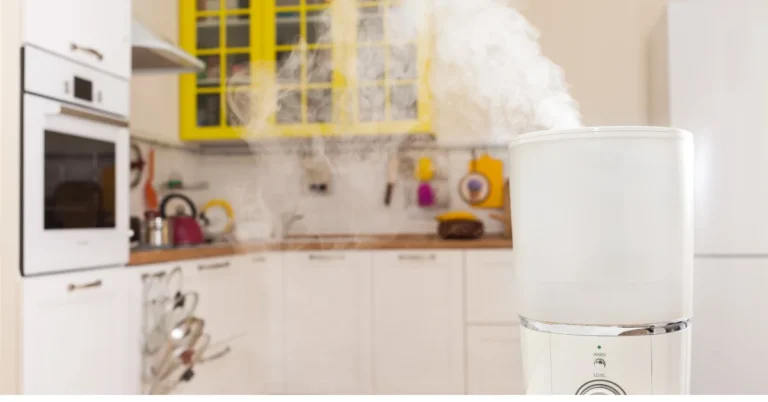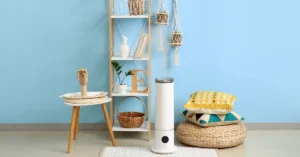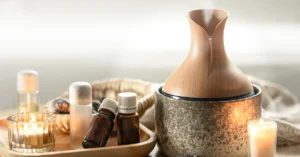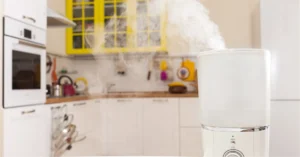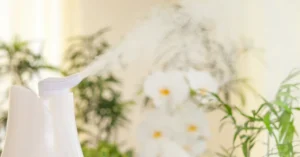Introduction
Have you ever looked at your humidifier’s manual and wondered, “Do I have to use distilled water in a humidifier?” It seems like an extra step, right? But you might be surprised to know that the type of water you use can make a big difference—not just for your humidifier’s lifespan but for the air quality in your home.
Humidifiers are a simple solution for dealing with dry indoor air, especially in colder months. But what’s not so simple is figuring out which type of water you should use. Many people are confused about why distilled water is recommended. Is it really necessary? Or are there other options?
In this post, we’ll dive into why distilled water is often suggested, what happens if you don’t use it, and what alternatives are available. By the end, you’ll know exactly what’s best for your humidifier—and your health.
What is Distilled Water and How Is It Different?
Before deciding if you need distilled water for your humidifier, it’s important to understand what it actually is. Distilled water goes through a process called distillation, where water is boiled, turned into steam, and then condensed back into liquid. This process removes minerals, impurities, and contaminants, leaving behind pure water.
But how does this differ from other types of water, like tap or purified? Well, tap water contains minerals such as calcium, magnesium, and sodium. These aren’t necessarily harmful for you to drink but can cause problems in your humidifier. Purified water, on the other hand, goes through filtration to remove some of the impurities but still retains some minerals.
This is why distilled water is often recommended—it’s the cleanest option, completely free from minerals. When you use it in your humidifier, it prevents things like mineral buildup and “white dust,” which we’ll explain further below.
Why Use Distilled Water in a Humidifier?
So, why is distilled water such a popular choice for humidifiers? It all comes down to keeping your air and device as clean as possible.
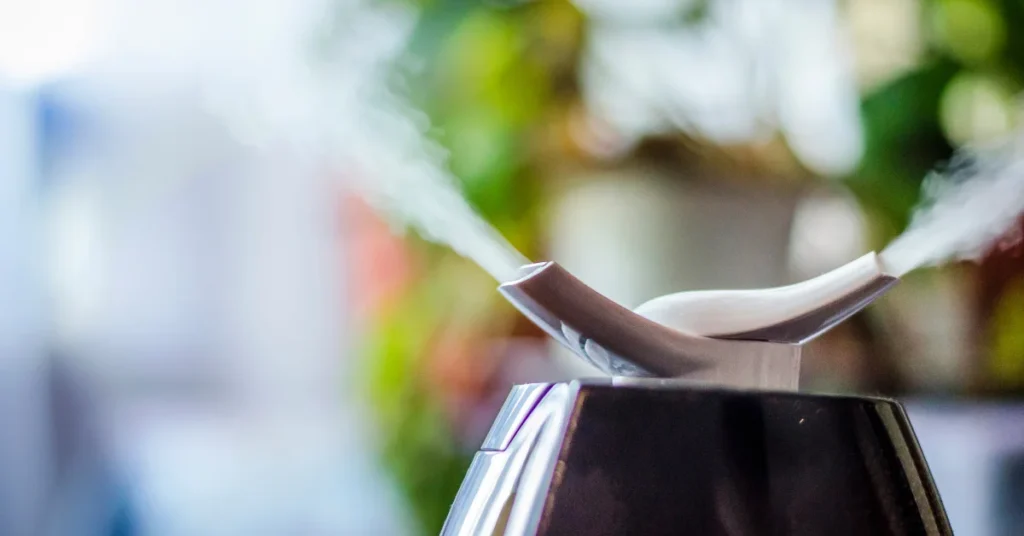
1. Preventing Mineral Buildup: Tap water contains minerals like calcium and magnesium. Over time, these can build up inside your humidifier, forming a crusty layer of mineral deposits. This can affect your humidifier’s performance, causing it to clog or stop working efficiently. Distilled water, however, is free from these minerals, keeping your humidifier running smoothly for longer.
2. Avoiding White Dust: If you’ve ever noticed a fine, white powder around your humidifier, that’s white dust. It’s caused by the minerals in tap water that are dispersed into the air when the humidifier operates. While this dust isn’t necessarily harmful, it can be annoying and may irritate those with respiratory conditions. Using distilled water eliminates the white dust problem altogether.
3. Reducing Bacteria and Mold Growth: Humidifiers can be a breeding ground for bacteria and mold if they’re not cleaned properly. While distilled water doesn’t completely prevent this, it does reduce the risk. Tap water often contains more impurities, which can encourage bacterial growth. Distilled water’s purity helps minimize this issue, creating cleaner air for you to breathe.
These are some of the main reasons why many manufacturers and experts recommend using distilled water. But does every humidifier require it? Let’s find out.
Do All Humidifiers Require Distilled Water?
Not all humidifiers are created equal, and not all of them strictly require distilled water. However, using distilled water can benefit almost any type of humidifier. Let’s break it down by type:
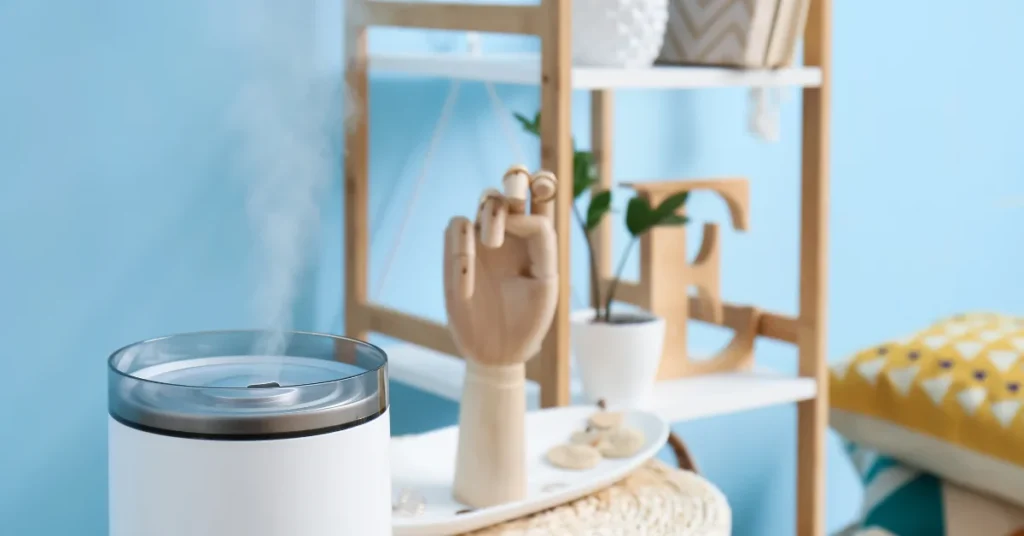
1. Ultrasonic Humidifiers: Ultrasonic humidifiers use high-frequency sound waves to create a cool mist. These are especially prone to producing white dust when used with tap water, as the ultrasonic process breaks down the minerals and disperses them into the air. Using distilled water helps prevent this, making it the best option for ultrasonic models.
2. Evaporative Humidifiers
Evaporative humidifiers work by blowing air through a wet wick, causing water to evaporate into the air. These are generally more forgiving when it comes to water type, but mineral deposits can still build up on the wick and reduce its efficiency over time. Distilled water helps to prolong the life of the wick and improve performance.
3. Warm Mist Humidifiers: Warm mist humidifiers boil water to create steam. While they naturally kill off some bacteria in the process, minerals in tap water can still cause scaling inside the humidifier. Over time, this buildup can damage the heating element and reduce the humidifier’s efficiency. Again, distilled water helps avoid this problem.
4. Central Humidifiers: These are built into your home’s heating and cooling system, and while you might not use distilled water for the entire house, a good filtration system can help reduce mineral content in the water being dispersed. However, for smaller portable units, distilled water is often recommended for optimal performance.
While using tap water won’t destroy your humidifier immediately, over time, it can cause more maintenance issues and may even lower the quality of the air you’re breathing.
What Happens If You Don’t Use Distilled Water?
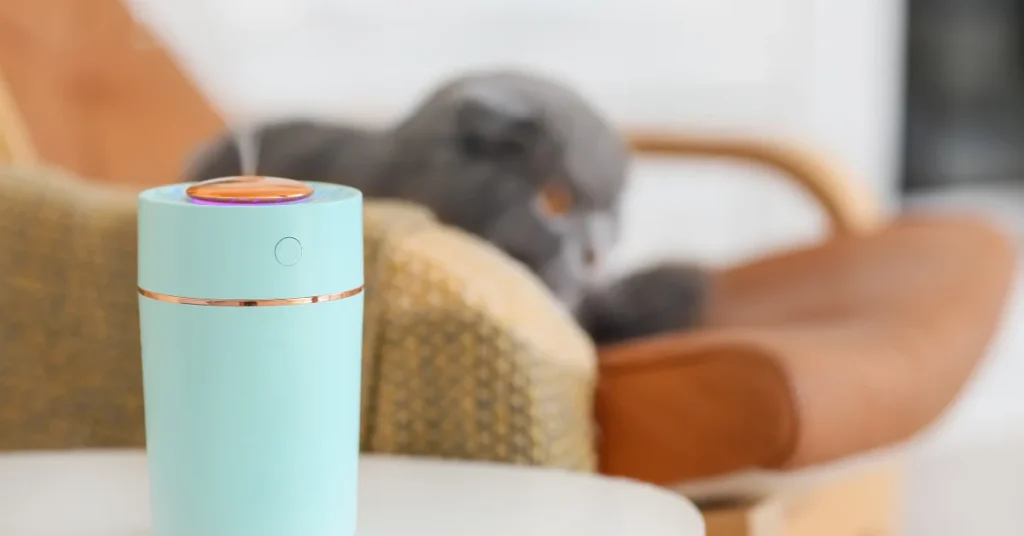
So, what if you decide to skip the distilled water and use regular tap water in your humidifier? While your humidifier might still work, there are a few potential downsides you’ll want to consider:
1. Mineral Buildup: As we touched on earlier, tap water contains minerals that can accumulate inside your humidifier over time. This buildup can lead to clogged parts and even damage the machine. If left unchecked, these deposits can reduce the humidifier’s efficiency or, in some cases, stop it from working altogether. Cleaning your humidifier more frequently may help, but it’s still a hassle.
2. White Dust: One of the most noticeable side effects of using tap water is the infamous white dust. This fine powder is made up of the minerals in your water and is released into the air along with the mist. While it’s not harmful to most people, it can irritate those with asthma or allergies, and let’s face it, no one enjoys cleaning dust off furniture every day.
3. Increased Risk of Bacteria and Mold: Tap water often contains more bacteria and contaminants than distilled water. When left sitting in a humidifier, especially if not changed frequently, this can encourage mold or bacteria growth inside the tank and get dispersed into the air. This could lead to unpleasant odors and even health issues, particularly for people with respiratory problems.
4. More Frequent Maintenance: Using tap water means you’ll need to clean your humidifier more often to prevent mineral buildup and keep bacteria at bay. This can become tedious, especially if you’re using your humidifier daily. Distilled water minimizes these risks, reducing the need for constant maintenance.
While using tap water in your humidifier isn’t the end of the world, it definitely brings more challenges. If you want a hassle-free experience and better air quality, distilled water is the way to go.
Alternatives to Distilled Water
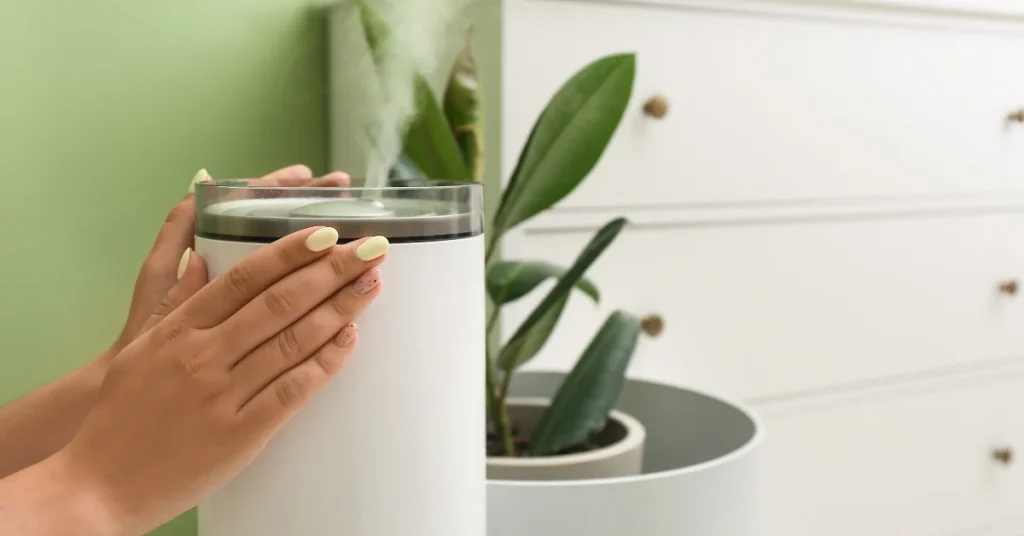
If you find that using distilled water regularly is inconvenient or costly, you might be wondering if there are other options for your humidifier. Fortunately, there are a few alternatives, but each comes with its own set of pros and cons.
1. Purified Water: Purified water is a common substitute for distilled water, but it’s not quite the same. Purified water goes through processes like reverse osmosis or carbon filtration to remove impurities. While it’s cleaner than tap water, it still contains trace minerals. These minerals can still contribute to some buildup over time, though it’s less than you’d get with untreated tap water.
If distilled water isn’t available, purified water can be a decent alternative, but it may still lead to a bit of white dust or mineral deposits.
2. Filtered Water: Filtered water is another option. While basic filtration systems can remove large particles and chlorine from tap water, they don’t remove minerals. Using filtered water in your humidifier can help reduce some contaminants, but it won’t prevent the formation of mineral buildup or white dust entirely. It’s better than tap water, but still not as effective as distilled.
3. Tap Water with a Demineralization Cartridge: Some humidifiers come with or are compatible with demineralization cartridges. These cartridges are designed to reduce the amount of minerals in the water, helping to cut down on white dust and buildup. While this won’t make your tap water as pure as distilled water, it can be a helpful solution if distilled water isn’t an option.
4. Boiled Water: Boiling tap water can help remove some impurities and bacteria, but it doesn’t remove minerals. While it’s a good idea if you’re worried about bacteria in your water, boiled water will still leave you with mineral deposits in your humidifier over time. If you’re looking for a cleaner, purer water source, boiled water isn’t a perfect replacement for distilled.
In short, while there are alternatives to distilled water, none of them are quite as effective at preventing buildup, white dust, and bacteria as distilled water. However, if distilled water is unavailable, purified or filtered water are reasonable substitutes, especially with added demineralization filters.
How to Make Distilled Water at Home
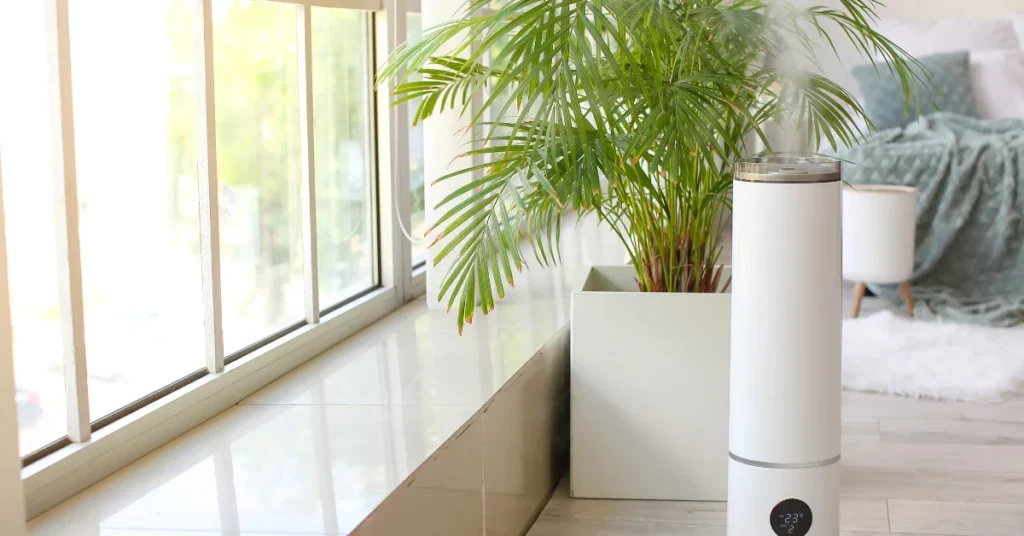
If you’ve decided that distilled water is the best choice for your humidifier but don’t want to buy it regularly, you can actually make it at home with a few simple tools. Here’s a step-by-step guide to creating your own distilled water:
What You’ll Need:
- A large pot with a lid
- A small heat-safe bowl
- Ice
- Stove or heat source
Step-by-Step Instructions
1. Fill the Pot with Water: Start by filling your large pot with tap water, about halfway. Make sure you leave enough room for the water to boil without splashing over the sides.
2. Place the Small Bowl in the Pot: Next, place the small bowl inside the large pot. This bowl is where the distilled water will collect, so make sure it’s heat-safe. It should float on top of the water, but don’t let water from the pot overflow into it.
3. Turn the Lid Upside Down: Put the lid on the large pot, but place it upside down. This way, as the water vapor rises, it will condense on the lid and drip into the small bowl.
4. Add Ice to the Lid: For faster condensation, add a few ice cubes to the top of the inverted lid. The cold surface helps the water vapor cool more quickly, turning it back into liquid.
5. Heat the Water to Boil: Turn on your stove and bring the water in the pot to a gentle boil. As the water boils, steam will rise, hit the cold lid, and drip down into the small bowl as distilled water.
6. Collect the Distilled Water: Let the process continue until you’ve collected enough water in the small bowl. Be careful when removing the bowl, as it will be hot. You can then store the distilled water in a clean, airtight container for use in your humidifier.
This method is simple and doesn’t require any fancy equipment, making it an easy way to keep a supply of distilled water on hand for your humidifier.
Practical Tips for Maintaining Your Humidifier
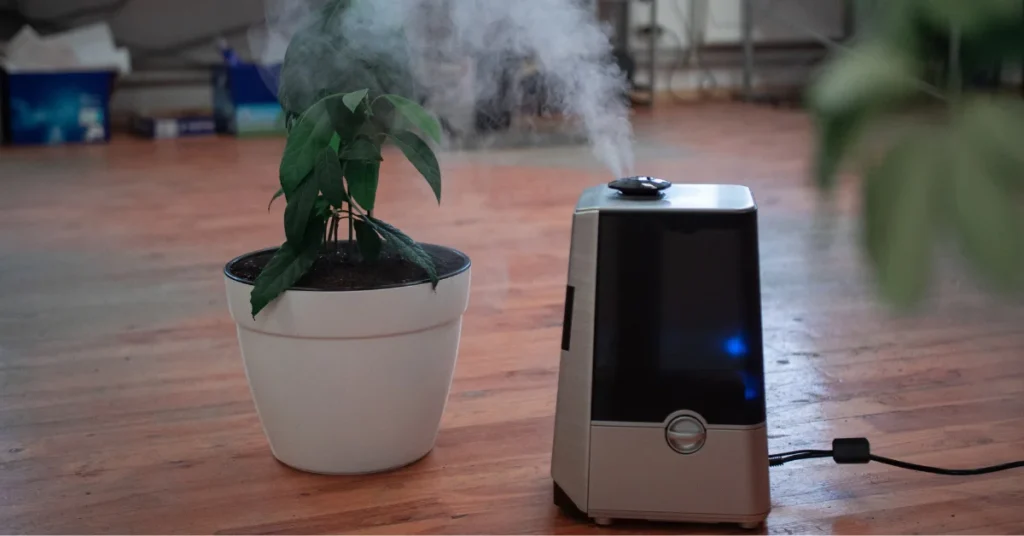
Even if you’re using distilled water, proper maintenance of your humidifier is crucial to ensure it continues to run smoothly and delivers clean, healthy air. Here are some practical tips to keep your humidifier in tip-top shape:
1. Change the Water Daily: No matter what type of water you use, it’s essential to change the water in your humidifier daily. Stagnant water can become a breeding ground for bacteria and mold, which can then be released into the air. Refill your humidifier with fresh water each day to avoid this.
2. Clean the Humidifier Regularly: Even with distilled water, cleaning your humidifier is a must. You should deep-clean it at least once a week, depending on how often you use it. This involves disassembling the unit, scrubbing the tank with a mild detergent or vinegar solution, and thoroughly rinsing it to remove any lingering residue or bacteria.
3. Avoid Letting Water Sit for Too Long: If you leave water sitting in your humidifier for days without use, it can encourage bacterial growth. Ideally, you should empty and dry out the tank if you’re not planning to use the humidifier for a while. But if you’re wondering, “How long can distilled water sit in a humidifier?”, it’s best not to let water sit for more than a day or two, even if it’s distilled.
4. Replace Filters as Needed: Many humidifiers, especially evaporative models, use filters or wicks that help trap impurities. Over time, these filters can become clogged with debris or minerals, reducing the humidifier’s efficiency. Be sure to follow the manufacturer’s recommendations for replacing filters and use demineralization cartridges if necessary.
5. Use Expired Distilled Water with Caution: If you have a jug of distilled water that’s been sitting around for a while, you might wonder, “Can you use expired distilled water in a humidifier?” Technically, distilled water doesn’t expire in the traditional sense. However, if it’s been sitting exposed to air or stored in an unsealed container, bacteria could have grown in the water. It’s safer to use freshly opened or properly stored distilled water to ensure it’s clean.
By following these simple steps, you’ll not only extend the life of your humidifier but also improve the quality of air in your home. Regular maintenance helps prevent any buildup and keeps your humidifier working at its best.
Conclusion
So, do you really have to use distilled water in a humidifier? The short answer: it’s highly recommended. While using tap water might seem convenient at first, it can lead to issues like mineral buildup, white dust, and even bacterial growth, all of which can negatively impact both your humidifier and your indoor air quality.
Distilled water, on the other hand, is free from minerals and impurities, helping to keep your humidifier running efficiently, extend its lifespan, and ensure that the mist it produces is clean and healthy for you to breathe. If distilled water is unavailable, alternatives like purified water or tap water with a demineralization cartridge can work in a pinch, but they’re not quite as effective.
Ultimately, the decision comes down to how much you value ease of maintenance and air quality. By choosing distilled water, you’re taking the simplest, most effective step toward a healthier home environment.
